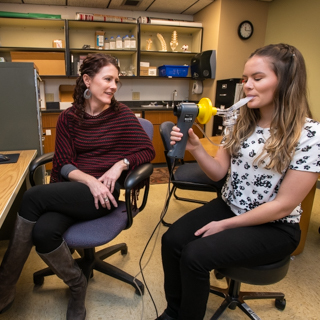Behavioral Research for Aphasia and Intensive Neurorehabilitation - BRAIN Lab
Mission
The mission of the Behavioral Research for Aphasia and Intensive Neurorehabilitation (BRAIN) Lab (P.I. Catherine Off, Ph.D.) at the University of Montana is to investigate the influence of intensive speech, language, and cognitive communication therapy on stroke and brain injury rehabilitation for patients and their family care partners.
People
Dr. Catherine (Cathy) Off is the director of the BRAIN Lab, Founder and Co-Director of the Big Sky Aphasia Program, and is Full Professor and Chair of the School of Speech, Language, Hearing, and Occupational Sciences.
Jenna Griffin-Musick is a speech-language pathologist, Clinical Assistant Professor, and director of the Big Sky Aphasia Program. She is also a doctoral student in Speech, Language, and Hearing Sciences.
To learn more about BRAIN Lab members, collaborations, projects, publications and more, visit our lab website:
For current BRAIN Lab information, follow us on Social Media at:
Impact
Research within the BRAIN Lab is focused on how principles of neuroplasticity including treatment intensity and dosage influence cognitive-communication rehabilitation outcomes for stroke and brain injury survivors and their family care partners.
Stroke is a leading cause of death in the United States and often leads to life-altering cognitive-communication disorders that require speech, language, and/or cognitive rehabilitation. Aphasia is an acquired impairment of language function that can impact speaking, listening, reading, and writing to varying degrees. Approximately 30% to 40% of stroke survivors experience aphasia and currently up to 4 million people in the United States have aphasia. Aphasia can significantly impair the stroke survivor's ability to communicate, limit their daily activities, and restrict their participation in life situations and social roles.
Intensive comprehensive aphasia programs (ICAPs) seek to treat the patient as a whole, including their language impairment, their activities of daily living, their participation in various roles, and their psychosocial well-being. When implementing a holistic health care model, attending to patient primary relationships is an essential mechanism in health service planning and implementation. Without the assistance of family care partners, many stroke survivors would not be able to remain in their homes.
